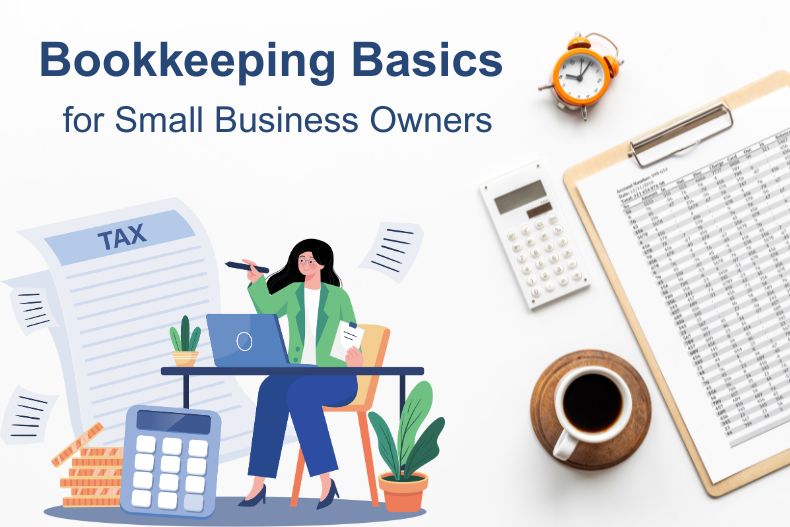What Are the Basics of Bookkeeping?
The basics of bookkeeping for small business owners come down to five core practices: tracking income and expenses, managing invoices and receipts, reconciling accounts, preparing key financial reports, and staying tax compliant. Whether you’re running a bakery, a freelance design firm, or an e-commerce shop, mastering these tasks helps you understand where your money goes, how much profit you’re making, and what steps you need to take to grow.
You don’t need to be a CPA to manage your books. But you do need a system—and the discipline to keep it updated. This article explains each component in detail so you can confidently take control of your business’s financial health.

Why Bookkeeping Matters
Bookkeeping isn’t just a box to check for tax season. It’s the financial backbone of your business. With accurate records, you can:
- Understand your cash flow
- Make informed business decisions
- Avoid penalties from tax agencies
- Apply for loans or bring on investors
- Spot financial red flags early
In fact, the U.S. Small Business Administration (SBA) emphasizes that strong financial recordkeeping is one of the key predictors of small business survival and growth.
The 5 Core Elements of Bookkeeping for Small Businesses
1. Recording Income and Expenses
At its most basic, bookkeeping is about tracking money in and money out. Every sale, return, business expense, vendor payment, or client deposit needs to be logged.
Use categories like:
- Sales and revenue
- Cost of goods sold (COGS)
- Utilities
- Marketing and advertising
- Payroll and benefits
- Office supplies
Pro Tip: Tools like QuickBooks, Xero, or Wave can automate much of this process if connected to your bank account and payment apps.
2. Keeping Supporting Documents
Every transaction should be backed by a receipt, invoice, bank statement, or bill. This is not only good practice but necessary for IRS audits and deductions.
Keep records of:
- Sales receipts and invoices issued
- Purchase receipts and bills
- Payroll records
- Tax filings and correspondence
- Bank and credit card statements
For IRS compliance, small businesses should retain tax-related documents for at least three years. (IRS.gov)
3. Reconciling Accounts Regularly
Reconciling means matching your internal financial records with your bank and credit card statements. It helps you catch:
- Bank errors
- Duplicate entries
- Missed transactions
- Fraud or unauthorized charges
Many businesses do this monthly, but weekly reconciliation is ideal for high-volume operations.
4. Generating and Understanding Financial Reports
There are three essential reports every business owner should be able to pull and understand:
- Profit and Loss (P&L) Statement
Also called an income statement. Shows revenue, costs, and net income. - Balance Sheet
Snapshot of assets (what you own), liabilities (what you owe), and owner’s equity. - Cash Flow Statement
Tracks the flow of cash in and out, giving you insight into your liquidity.
These reports help you evaluate performance, make budgeting decisions, and prepare for tax season or investor meetings.
5. Staying Tax Compliant
As a business owner, you must:
- Collect and remit sales tax (if applicable in your state)
- Withhold and submit payroll taxes (if you have employees)
- File quarterly estimated income taxes (for pass-through entities or sole props)
- Provide 1099s to contractors or freelancers
Visit the IRS Small Business Tax Center to find your exact filing requirements and deadlines.
How to Set Up Your Bookkeeping System
Choose Your Bookkeeping Method
- Single-entry bookkeeping: Simple, records one entry per transaction. Best for freelancers or very small operations.
- Double-entry bookkeeping: Tracks debits and credits for each transaction. Offers a complete view of financial health and is better for growing businesses.
Pick Manual vs. Digital
Manual (spreadsheet or paper ledger) is fine for microbusinesses. However, digital bookkeeping:
- Minimizes errors
- Saves time
- Offers real-time reports
- Often includes tax and payroll tools
Many small business owners choose accounting software like QuickBooks because it streamlines everything from invoicing to reporting. If you’re new to this tool, check out our guide: What is QuickBooks?—it breaks down how it works and why it’s such a popular choice for business owners.
When to DIY and When to Hire a Bookkeeper
DIY Bookkeeping Is Great When:
- Your transaction volume is low
- You use simple invoicing and expense tracking
- You want to understand your financials hands-on
Hire a Bookkeeper or CPA If:
- You have employees and payroll taxes
- You’re struggling to stay organized
- You’re preparing for growth or funding
- You’re dealing with multiple income streams or inventory
A professional can save you hours of time and thousands in errors.
Common Bookkeeping Mistakes (and How to Avoid Them)
- Mixing personal and business expenses
→ Open a dedicated business bank account.
- Not backing up your financial records
→ Use cloud-based software with automatic backups.
- Waiting until tax season to update records
→ Set a recurring weekly reminder to review your books.
- Ignoring small expenses
→ Small costs add up. Track everything for better financial clarity and tax deductions.
Frequently Asked Questions (FAQs)
How much time should I spend on bookkeeping each week?
Most small businesses can manage their books in 1–2 hours a week if done consistently. The key is not letting it pile up.
What’s the difference between a bookkeeper and an accountant?
Bookkeepers record and organize transactions. Accountants analyze those records, prepare reports, and often help with taxes and strategy.
Can I do my own bookkeeping without software?
Yes, especially for a sole proprietorship or side hustle. But as your business grows, software will become more efficient and accurate.
Final Thoughts
Bookkeeping doesn’t need to be overwhelming. With just a few foundational practices—recording transactions, organizing documents, reconciling accounts, and reviewing reports—you can stay compliant and confident in your business finances. The earlier you build a solid bookkeeping system, the smoother your path to growth becomes.
Don’t wait for tax season to get organized. Start today, and give your business the clarity it needs to thrive.





